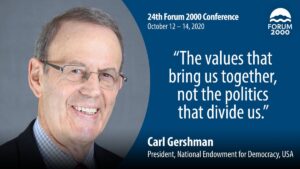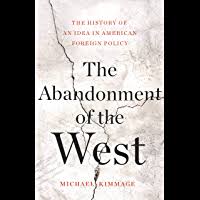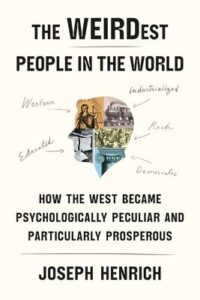The West finds itself in an existential crisis, argues Yaroslav Trofimov. Its role as a global beacon is in doubt, and institutions such as NATO are, in the words of French President Emmanuel Macron, “brain-dead.” Nationalist populism on the right and identity politics on the left threaten what used to be a broad consensus rooted in shared values of democracy and human rights—a consensus borne of the struggles of World War II and the Cold War, he writes for The Wall Street Journal:
At the same time, China’s astonishing rise over the past three decades suggests that prosperity can indeed come without freedom—a new paradigm that is inspiring autocrats around the world. The coronavirus pandemic that appears contained in China has also hit much of the West particularly hard, repeatedly ravaging economies on both sides of the Atlantic as most governments failed to halt the disease’s second wave…..Nor are the threats to the West just external. As the continuing controversy over this week’s U.S. elections demonstrates, faith in the fundamental fairness of democratic institutions is, for many, no longer a given amid a political polarization that often generates echo chambers of conspiracy theories.
 “The idea of the West is still there, but it’s on life support,” said Brian Katulis, a senior fellow at the left-leaning Center for American Progress. “And it’s in part because it’s been stressed from within these democracies. Termites—the angry populist forces on both the right and the left that are deeply illiberal—have been chipping away at open societies from within.”
“The idea of the West is still there, but it’s on life support,” said Brian Katulis, a senior fellow at the left-leaning Center for American Progress. “And it’s in part because it’s been stressed from within these democracies. Termites—the angry populist forces on both the right and the left that are deeply illiberal—have been chipping away at open societies from within.”
China’s ruling Communist party aims to take advantage of the “profound adjustment in the international balance of power” arising from a weakened West and a politically gridlocked United States, The Economist adds.
 The West is in the middle of what the EU’s Minister for Foreign Affairs Josep Borrell has called a “battle of narratives” between countries like China and Russia espousing authoritarian values, and democratic countries that need to defend democratic values that are under assault, said Carl Gershman, president of the National Endowment for Democracy (NED):
The West is in the middle of what the EU’s Minister for Foreign Affairs Josep Borrell has called a “battle of narratives” between countries like China and Russia espousing authoritarian values, and democratic countries that need to defend democratic values that are under assault, said Carl Gershman, president of the National Endowment for Democracy (NED):
The great investment that China and Russia, among others countries, are making in media and other forms of ideological infrastructure to revise and undermine the norms of democratic societies and the international liberal order show that the conflict over values and the defense of freedom and the rule of law has become a new arena of strategic competition. In this new period, the need for a strong alliance of democracies and a reinvigorated transatlantic relationship has become at least as important as it was during the Cold War.
What’s needed most of all is renewed political will and a readiness to work together among the world’s leading democracies, he told the recent Estoril Political Forum (above).
Four recent factors helped fuel the relentless rise of China, Europaeum’s Paul Flather told the forum: the controversial admission of China into the WTO; US withdrawal from its role as global referee or policeman; the 2008-9 global recession, and, now, the mishandled Covid-19 pandemic, which have both hit what was once the developed ‘West’ hard.
 Michael Kimmage’s The Abandonment of the West should be read in light of today’s transatlantic squabbles over NATO and trade amidst Chinese and Russian revisionism, which combined seem a wake-up call to rearm the West of its long forsaken civilizational panache, argues Jorge González-Gallarza Hernández.
Michael Kimmage’s The Abandonment of the West should be read in light of today’s transatlantic squabbles over NATO and trade amidst Chinese and Russian revisionism, which combined seem a wake-up call to rearm the West of its long forsaken civilizational panache, argues Jorge González-Gallarza Hernández.
These two facets in Kimmage’s definition of the West—culture and geopolitics—seem to have balanced each other out since the fall of the Berlin Wall, he writes for The National Interest:
The version of the West that seemed irreversibly ascendant then was a purely technocratic one, symphonious with the siren song of cultural relativism and devoid of the intellectual élan that over centuries propelled mankind to that blissful moment. Whether today’s enflamed geopolitics are partly a recoil from reducing the West to open markets and democratic polities in the 1990s is a thorny question, but one that tugs at the decadent dynamic of a West sowing the seeds of its own cultural disavowal along the path to geopolitical omnipotence.
 In his new book, The Weirdest People in the World: How the West Became Psychologically Peculiar and Particularly Prosperous, Joseph Henrich, a professor of human evolutionary biology at Harvard, has devised a teasing term to describe societies where rules and values have come together with benign results: Western, educated, industrialised, rich and democratic. The acronym, WEIRD, neatly makes his point that these attributes, and the mindset that goes with them, are the exception not the rule in human history, The Economist adds:
In his new book, The Weirdest People in the World: How the West Became Psychologically Peculiar and Particularly Prosperous, Joseph Henrich, a professor of human evolutionary biology at Harvard, has devised a teasing term to describe societies where rules and values have come together with benign results: Western, educated, industrialised, rich and democratic. The acronym, WEIRD, neatly makes his point that these attributes, and the mindset that goes with them, are the exception not the rule in human history, The Economist adds:
The values that underpin weirdness, he writes, include a tough-minded belief in the rule of the law, even at the risk of personal disadvantage; an openness to experimentation in matters of scientific knowledge or social arrangements; and a willingness to trust strangers, from politicians offering new policies to potential business partners. These may not seem original insights, but Mr Henrich’s work is distinguished by the weight he places on the extended family as an obstacle to healthy individualism, and on religious norms as the determinant of family obligations. He reinforces this theme with a welter of polling data and sweeping historical arguments, mostly about medieval Europe.
The West defeated Nazism and Communism, but can it continue to lead the world in a new era defined by populist nationalism and rising Chinese power? https://t.co/1kZNaNhVBX via @WSJ
— Democracy Digest (@demdigest) November 9, 2020







